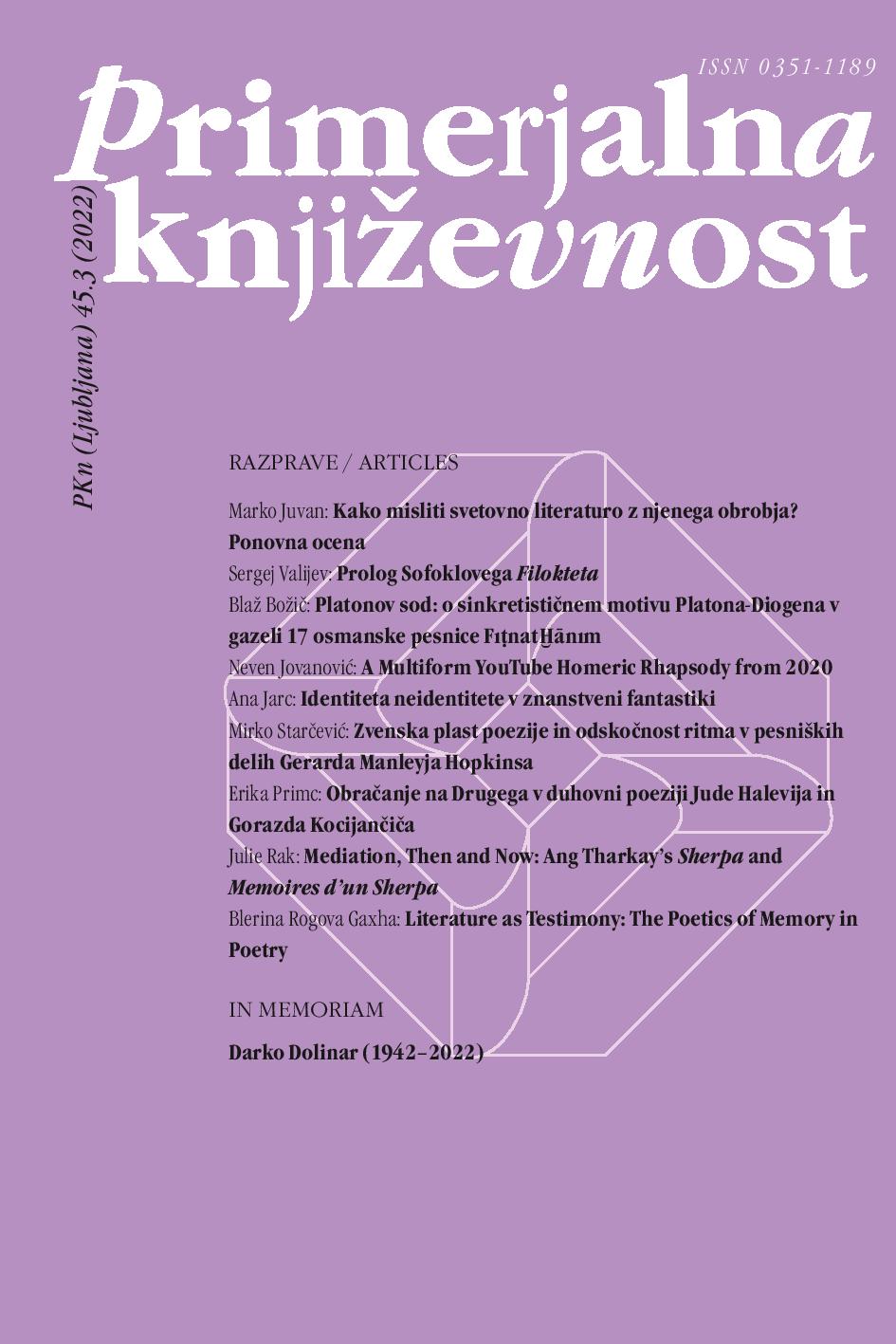Multiformna homerska rapsodija iz leta 2020 na portalu YouTube
DOI:
https://doi.org/10.3986/pkn.v45.i3.04Ključne besede:
antika, grška književnost, literarna recepcija, Homer: Odiseja, spletni dogodkiPovzetek
Odiseja okoli sveta je bila skupno javno branje Homerjeve Odiseje, objavljeno na portalu YouTube decembra 2020, na vrhuncu pandemije COVID-19. Branje, ki je izhajalo iz širše pobude Reading Greek Tragedy Online in ga je organiziral Center za helenske študije Univerze Harvard, je vključevalo uprizoritve vsake knjige Odiseje s strani študentov, profesorjev, igralcev in laikov iz približno dvajsetih držav. Sodelujoče so spodbujali, da so nastopali v svojem jeziku, lahko pa so uporabljali tudi staro grščino ali kateri koli drug jezik; besedilo so lahko bodisi brali, recitirali, peli ali igrali. Rezultat, ki je še vedno na voljo na spletu, je na kratko opisan v članku. Ko razmišljam o tem dogodku, opažam, da so javna branja in YouTube videi kot žanri in kulturne dejavnosti le redko vključeni v raziskave homerske recepcije. Dogodek Odiseja okrog sveta odlikuje izrazita raznolikost; na ta način se povezuje z aktualnimi razpravami o »klasičnih vedah« kot akademski disciplini in s teorijo multiformnega, diahronega razvoja homerskih pesnitev. Dogodek obenem pokaže tako na prednosti kot na omejitve tehnologije in, kar je najpomembnejše, osvešča nas o razdalji med homerskimi pesmimi kot uprizoritvijo v stari Grčiji in danes prevladujočim načinom, ko jih obravnavamo kot čtivo.
Literatura
“ANU Acknowledgment of Country.” <em>Australian National University</em>. Web. Access 17 Oct. 2022. https://services.anu.edu.au/human-resources/respect-inclusion/anu-acknowledgment-of-country/.
Adler, Eric. <em>Classics, the Culture Wars, and Beyond</em>. Ann Arbor, MI: University of Michigan Press, 2016.
Barlik, Memet. “Ozan and Dengbej: The Lost Voices of Oral Tradition in Turkey.” <em>Social Sciences Studies Journal</em> 63.6 (2020): 2186–2201.
Burgess, Jonathan. “Recent Reception of Homer: A Review Article.” <em>Phoenix</em> 62.1–2 (2008): 184–195.
Foley, John M. <em>A Companion to Ancient Epic</em>. Malden, MA: Blackwell Publishing, 2013.
Hall, Edith. <em>The Return of Ulysses: A Cultural History of Homer’s Odyssey</em>. Baltimore, MD: Johns Hopkins University Press, 2008.
Lombardo, Stanley. <em>Odyssey</em>. Indianapolis, IN: Hackett, 2000.
OECD. “Recognition of Non-formal and Informal Learning – Home.” Web. Access 17 Oct. 2022. https://www.oecd.org/education/skills-beyond-school/recognitionofnon-formalandinformallearning-home.htm.
McDaniel, Spencer. “The Debate about Classics Isn’t What You Probably Think It Is.” <em>Tales of Times Forgotten</em>. 26 Feb. 2021. Web. Access 17 Oct. 2022. https://talesoftimesforgotten.com/2021/02/26/the-debate-about-classics-isnt-what-you-probably-think-it-is/.
McWhorter, John. “The Problem with Dropping Standards in the Name of Racial Equity.” <em>The Atlantic</em>. 7 June 2021. Web.
Nagy, Gregory. <em>Homer the Classic</em>. Washington, DC: Center for Hellenic Studies, 2008.
Nagy, Gregory. <em>Homeric Questions</em>. Austin, TX: University of Texas Press, 1996.
Nagy, Gregory. <em>Plato’s Rhapsody and Homer’s Music: The Poetics of the Panathenaic Festival in Classical Athens</em>. Hellenic Studies Series 1. Washington, DC: Center for Hellenic Studies, 2002.
Nagy, Gregory. <em>Poetry as Performance: Homer and Beyond</em>. Cambridge: Cambridge University Press, 1996.
Poser, Rachel. “He Wants to Save Classics from Whiteness: Can the Field Survive?” <em>The New York Times</em>. 2 Feb. 2021. Updated 25 Apr. 2021. Web.
Ryder, Andrew. <em>The Challenge to Academic Freedom in Hungary: A Case Study in Authoritarianism, Culture War and Resistance</em>. Berlin: Walter de Gruyter, 2022.
Skafte Jensen, Minna. “Performance.” Foley, John M. <em>A Companion to Ancient Epic</em>. Malden, MA: Blackwell, 2005. 45–54.
Turner, Victor. “Liminality and Communitas.” <em>The Ritual Process: Structure and Antistructure</em>. Chicago, IL: Aldine Publishing, 1969. 94–113, 125–130.


